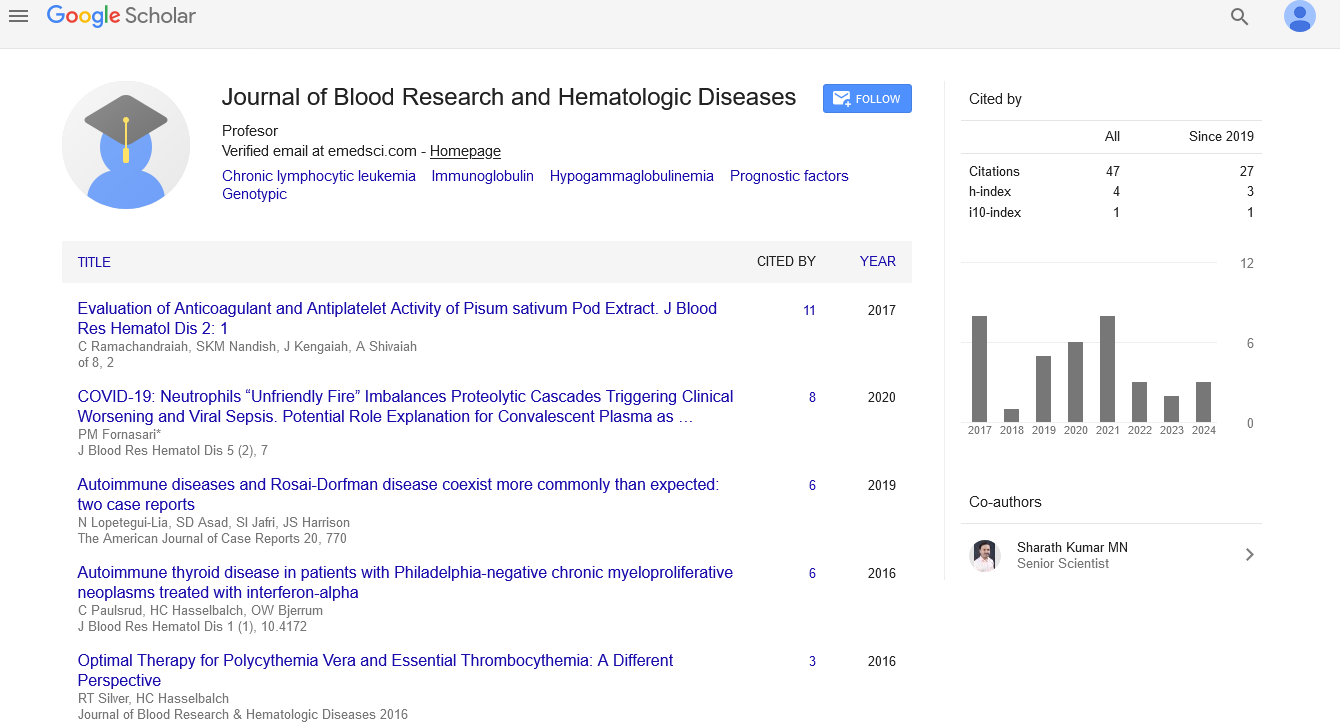Commentary, J Blood Res Hematol Dis Vol: 8 Issue: 2
Emerging Therapeutic Approaches for Blood Malignancies
Jamie Morgan*
1Department of Oncology, St Jude Children's Research Hospital, Memphis, United States of America
*Corresponding Author: Jamie Morgan,
Department of Oncology, St Jude
Children's Research Hospital, Memphis, United States of America
E-mail: morgan55@stjcrh.edu
Received date: 29 May, 2023, Manuscript No. JBRHD-23-106781;
Editor assigned date: 31 May, 2023, PreQC No. JBRHD-23-106781 (PQ);
Reviewed date: 14 June, 2023, QC No. JBRHD-23-106781;
Revised date: 21 June, 2023, Manuscript No. JBRHD-23-106781 (R);
Published date: 28 June, 2023, DOI: 10.4172/jbrhd.1000168
Citation: Morgan J (2023) Emerging Therapeutic Approaches for Blood Malignancies. J Blood Res Hematol Dis 8:2.
Description
Blood malignancies, also known as hematologic cancers, pose significant challenges in clinical practice. Traditional treatment modalities such as chemotherapy and radiation therapy have been the mainstay of management, but their limitations have sparked the search for innovative therapeutic approaches. In recent years, exciting advancements in investigation and technology have led to the emergence of novel therapies that hold great promise for improving outcomes in patients with blood malignancies.
Targeted therapies
Targeted therapies have transformed the treatment landscape for several blood malignancies. These therapies aim to specifically inhibit molecular targets that play a important role in cancer growth and survival. One example is the use of Tyrosine Kinase Inhibitors (TKIs) in Chronic Myeloid Leukaemia (CML), targeting the BCR-ABL fusion protein. TKIs have revolutionized CML management, achieving deep and durable responses and significantly improving long-term outcomes for patients.
Another targeted therapy approach involves monoclonal antibodies that selectively bind to specific proteins on cancer cells, leading to their destruction. Rituximab, for instance, targets CD20 in B-cell lymphomas, resulting in improved response rates and overall survival. The success of monoclonal antibodies has spurred the development of novel antibodies against other targets in blood malignancies, expanding treatment options and improving outcomes.
Immunotherapies
Immunotherapies harness the power of the immune system to recognize and eliminate cancer cells. Chimeric Antigen Receptor (CAR) T-cell therapy represents a groundbreaking approach in the treatment of certain blood malignancies. CAR T-cell therapy involves genetically modifying a patient's own T cells to express a receptor that recognizes a specific antigen on cancer cells, leading to their destruction. This innovative therapy has shown remarkable success in patients with relapsed or refractory B-cell Acute Lymphoblastic Leukaemia (ALL) and certain types of lymphomas, achieving high response rates and durable remissions.
Immune checkpoint inhibitors have also demonstrated impressive results in blood malignancies. These drugs block proteins that dampen the immune response, allowing immune cells to effectively recognize and attack cancer cells. Pembrolizumab and nivolumab, for example, have shown efficacy in the treatment of classical Hodgkin lymphoma and certain subtypes of non-Hodgkin lymphoma.
Gene therapies
Gene therapies offer a promising avenue for treating blood malignancies by introducing genetic material into cells to correct or modify their function. One approach involves the use of viral vectors to deliver therapeutic genes into cancer cells. For instance, in the treatment of relapsed or refractory B-cell ALL, Chimeric Antigen Receptor (CAR) T-cell therapy has shown remarkable success. Engineered CAR T cells targeting the CD19 antigen have demonstrated high response rates, leading to the approval of CAR Tcell therapies for certain indications.
Additionally, gene editing technologies, such as Clustered Regularly Interspaced Short Palindromic Repeats (CRISPR), CRISPR-associated protein 9 (Cas9), hold promise for precise and targeted modifications of genes in cancer cells. These advancements pave the way for personalized therapies and the potential to address genetic alterations that drive blood malignancies.
Conclusion
Emerging therapeutic approaches for blood malignancies represent a paradigm shift in the treatment landscape. Targeted therapies, immunotherapies, and gene therapies offer novel strategies that specifically target cancer cells, harness the power of the immune system, and modify genes to combat blood malignancies. These innovative approaches have demonstrated significant improvements in patient outcomes, including higher response rates, longer remissions, and improved overall survival.
 Spanish
Spanish  Chinese
Chinese  Russian
Russian  German
German  French
French  Japanese
Japanese  Portuguese
Portuguese  Hindi
Hindi 